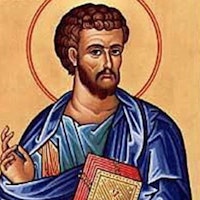Your eye is the lamp of your body; when your eye is sound, your whole body is full of light…
Your eye is the lamp of your body; when your eye is sound, your whole body is full of light…
Saint Luke

Your Eye Is the Lamp
Theme: The Light of Truth
Your eye is the lamp of your body; when your eye is sound, your whole body is full of light; but when it is not sound, your body is full of darkness. Therefore be careful lest the light in you be darkness. If then your whole body is full of light, having no part dark, it will be wholly bright, as when a lamp with its rays gives you light.
Saint Luke, also known as Luke the Evangelist, was born a Greek and a Gentile in Antioch, Syria. He was a physician and it is believed that he may have also been a slave, as it was not uncommon in his day for slaves to be educated in medicine so the family would have a resident physician. He was the first Christian physician and was venerated by the Catholic Church as the patron saint of physicians and surgeons.
Luke joined Paul at Troas in the year 51, accompanying him from Macedonia to Philippi. It is very possible that Luke provided medical assistance to Paul when he had been beaten, stoned, or nearly drowned while evangelizing to the Western Roman Empire. Luke explains in the introduction to his gospel that his writings were inspired by close association with Paul and his companions.
In the stained glass window at St. John's Episcopal Church in Stamford, Connecticut, St. Luke is shown holding a book that represents his Gospel. In his other hand, he holds a plant, representing healing herbs. Luke remained with Paul to the end of his life, even during his imprisonment and sufferings, "Only Luke is with me" (2 Timothy 4:11).
Luke is the only Gentile to have written books in the Bible. He is the writer of the third Gospel and the Acts of the Apostles and his writings have been proven to be historically accurate.
In the third Gospel, Luke emphasizes Christ's compassion for sinners and for those who suffer. The gospel of Luke focuses on the poor and oppressed, encouraging tenderness and compassion for the less fortunate. The story of Lazarus and the Rich Man who ignored him is told in Luke's gospel, as is the parable of the Good Samaritan.
The Gospel of Luke stresses the importance of evangelizing to the Gentiles. In the Gospel of Luke, we hear Jesus praising the faith of Gentiles such as the widow of Zarephath and Naaman the Syrian (Lk.4:25-27), and we hear the story of the one grateful leper who is a Samaritan (Lk.17:11-19).
Unlike the Jewish writings, women have an important place in Luke's gospel. Luke writes about the women who accompanied Jesus, such as Mary Magdalene, Joanna, Susanna, and Martha and Mary, and "many other women who used their own resources to help Jesus and his disciples" (8:1). Luke also writes about the birth of Christ from Mary's point of view and she is especially important in Luke's gospel.
It is only in the gospel of Luke that the story of Mary's Annunciation, her visit to Elizabeth, the Magnificat, the Presentation and Jesus' remaining in Jerusalem are told. In Luke's gospel, we learn the words spoken by the angel to Mary at the Annunciation, "Hail Mary, full of grace" and Elizabeth's words to Mary, "Blessed are you and blessed is the fruit of your womb, Jesus."
Luke's Christian ministry can be followed in the book of Acts. Up until the sixteenth chapter the story of Acts is written in the third person, much like an historian recording facts. The voice of the narrator then changes to first person and scholars believe this is done at the time Luke first joined Paul at Troas in the year 51. The book of Acts switches back to third person and scholars believe that this reflects a period in time when Luke was not present during the events that are recorded.
Though some historians claim that St. Luke was martyred after the death of Saint Paul, others say he lived a long life, dying at the age of 84 after settling in Greece to write his gospel.
The Gospel of Luke
Wilson, Andrew, editor. World Scripture - a Comparative Anthology of Sacred Texts. Paragon House, 1991, p. 381 [Luke 11.34-36].

Saint Luke
Theme: The Light of Truth

Luke 11:33-36 NRSV
Eugene Peterson’s Translation of the Bible, Called “The Message”
Commentary by DJL about Luke 11:33-36
What are you looking at?
The analogy Jesus uses here takes a few twists and turns. The eye, he says, is like a lamp. If it is —perhaps, is looking at healthy—fills the body with light. But if it is unhealthy—looking at unhealthy things—it fills the body with darkness.
So what are you looking at? What do you notice? And to what do you give your attention?
Headlines that show only bad news rather than neighbors doing good? The faults of others rather than their virtues? The shortcomings of family and friends rather than their loyalty? What are you looking at?
Over time, I believe, we are train ourselves to look at certain things. If we look at good things—things that uplift and inspire—we train ourselves to seek out those things and continue to be built up, be inspired, and inspire others. If we look at the negative in the world, we train ourselves always to seek out the bad.
This isn’t about being a Pollyanna and ignoring what is difficult in life. But it is recognizing that we often have a choice. There is good and bad in the world. We may notice both, but what will we focus on?
Or maybe it’s not just what we’re looking at, but how. Eugene Peterson, in his wonderful translation of the Bible called “The Message,” put it this way:
Well said!
Prayer: Dear God, direct our attention to those things in life that inspire and build up, so that when we encounter the darkness we may share the light you have entrusted to us to encourage other and light up the world. In Jesus’ name, Amen.
—David Lose, In the Meantime, Commentary by DJL about Luke 11:33-36.
Resources
Related Quotes
Copyright © 2017 – 2026 LuminaryQuotes.com About Us